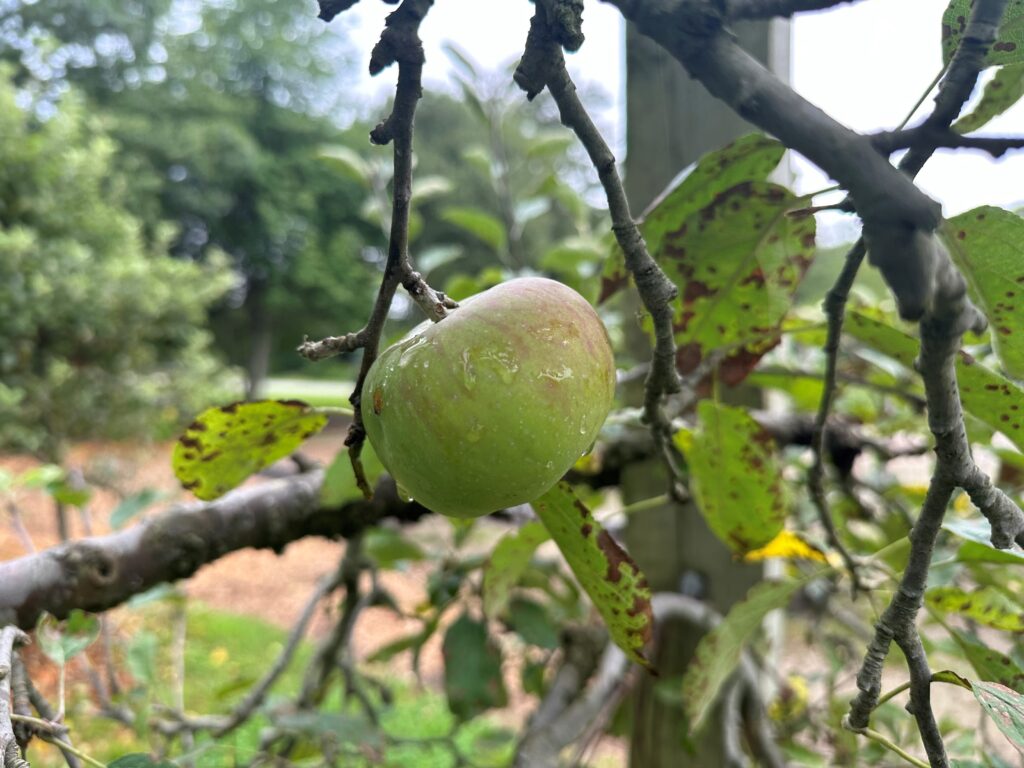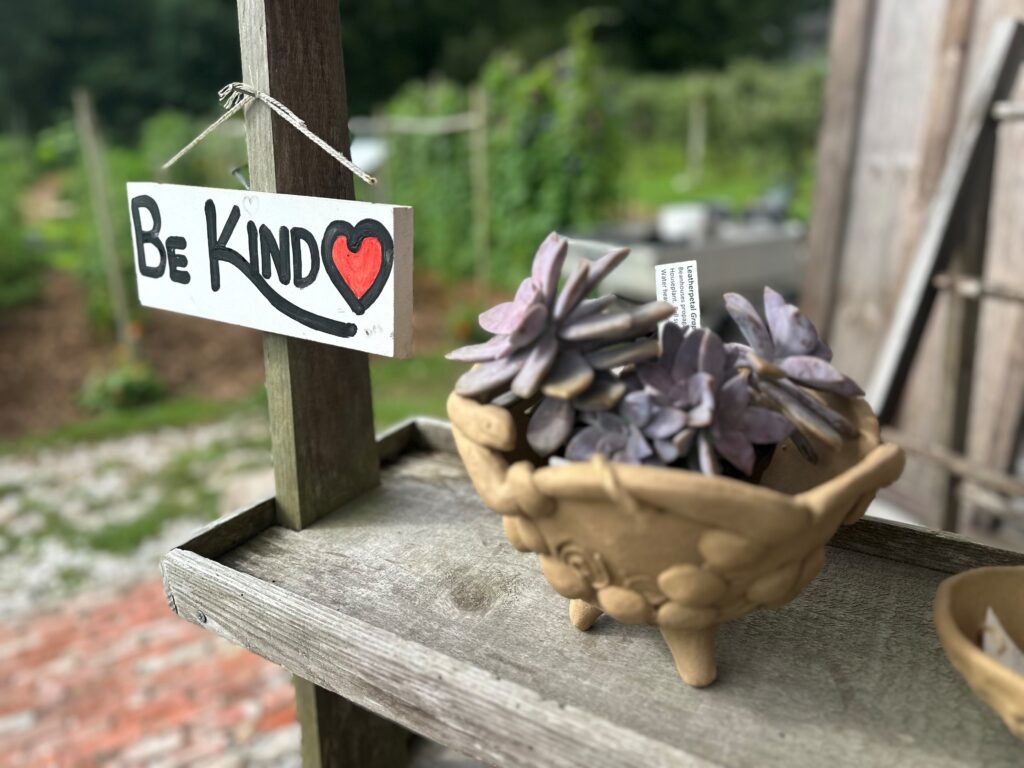Small World Farm is the prefect autumn destination
By Bob Curley
In Little Compton, the Bowen family has established an artful roadside farm stand — and taken a bite at organic apple farming
A commitment to natural farming and community building sits at the core of Small World Farm, an organic apple orchard in Little Compton run by husband-wife duo Patrick and Claire Bowen with an assist from their daughter, Elizabeth. And while cultivating apples without chemical fertilizers or pesticides is an ongoing challenge, the Bowens’ deep roots in the community have helped make their hand-built farm stand on Long Highway a local gathering place — even when the trees decide this isn’t the year to produce any fruit.
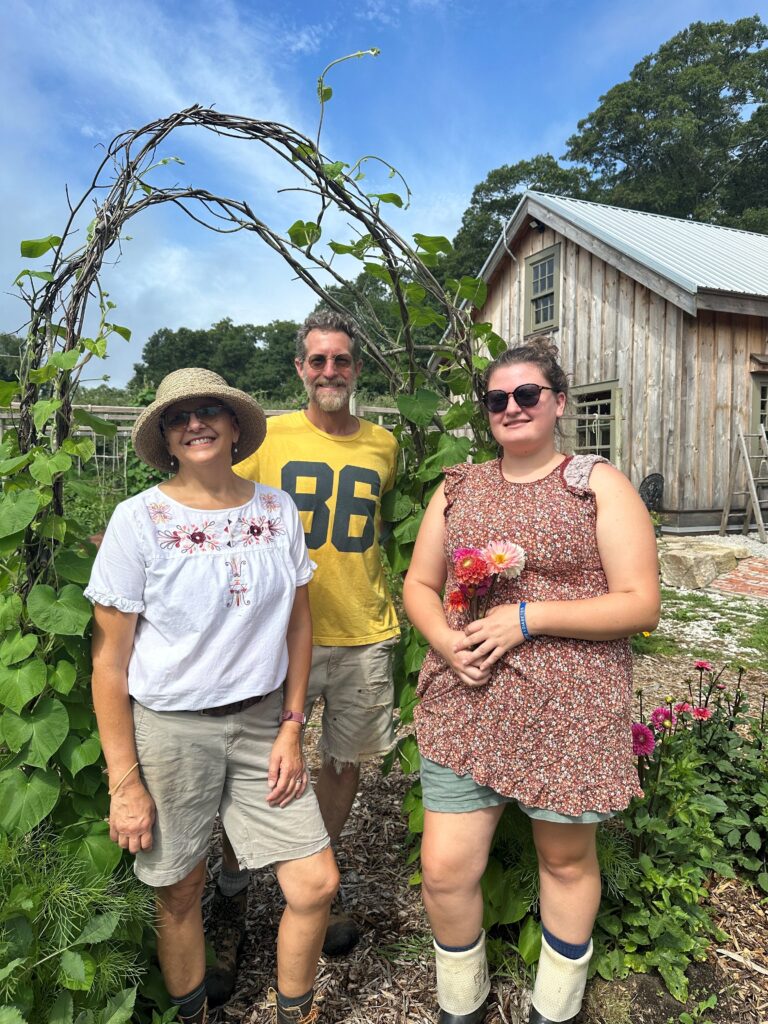
“Anyone who grows apples around here would acknowledge that it’s almost impossible to grow them organically,” says Patrick, standing amid the couple’s 700-odd apple trees, which this season have yielded just a handful of healthy apples. “We look at it as a challenge. We’re never going to have the world’s biggest apple orchard, but we feel like we are caretakers in a sense.”
Old Stone Orchard cultivated a two-acre apple orchard next door to the Bowen home for years. Among the rows of Ida Red, Cortland, Empire, Macoun, Granny Smith, Fuji, and Honeycrisp apple trees were some that had been planted almost 40 years ago.
The Bowens knew what they had to do when the owners put the property on the market four years ago.
When we looked out our window and saw all these beautiful trees, we didn’t want them to be cut down to build homes,” says Patrick.
Claire, an artist who has largely swapped her paintbrushes for pruning shears as head of the farm, says the decision to move away from growing with chemical fertilizers and pesticides — the farm received its official organic certification from the U.S. Department of Agriculture this spring — arose from both personal and practical concerns.
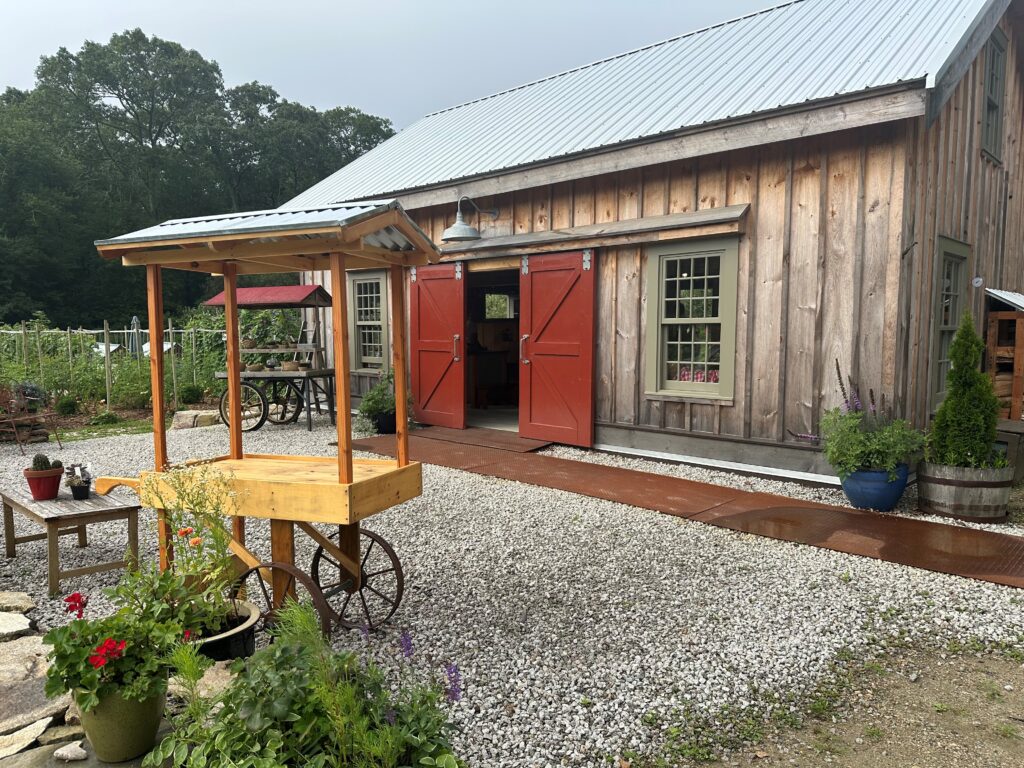
“We live next door,” she says, “and there are two well-established orchards in town, so we had to position ourselves in a different way.”
Apples have been cultivated in southern New England almost since the Mayflower sailed into nearby Plymouth in 1620, but the humid coastal climate has always been a challenge to growers.
“There’s a huge fungal presence,” Patrick explains. Insects and disease also take their toll on the crop, and the Bowens estimate they lose about one-third of their apples to hungry deer every year.
The farmers fight back with natural pesticides certified by the Organic Materials Review Institute (OMRI) and by building birdhouses and bat houses to help control the insect population. But the Bowens are still figuring out how to coax a seasonal fruit crop out of their trees. “We didn’t have a crop this year,” says Patrick, noting that apple trees “by nature tend to be biennial.”
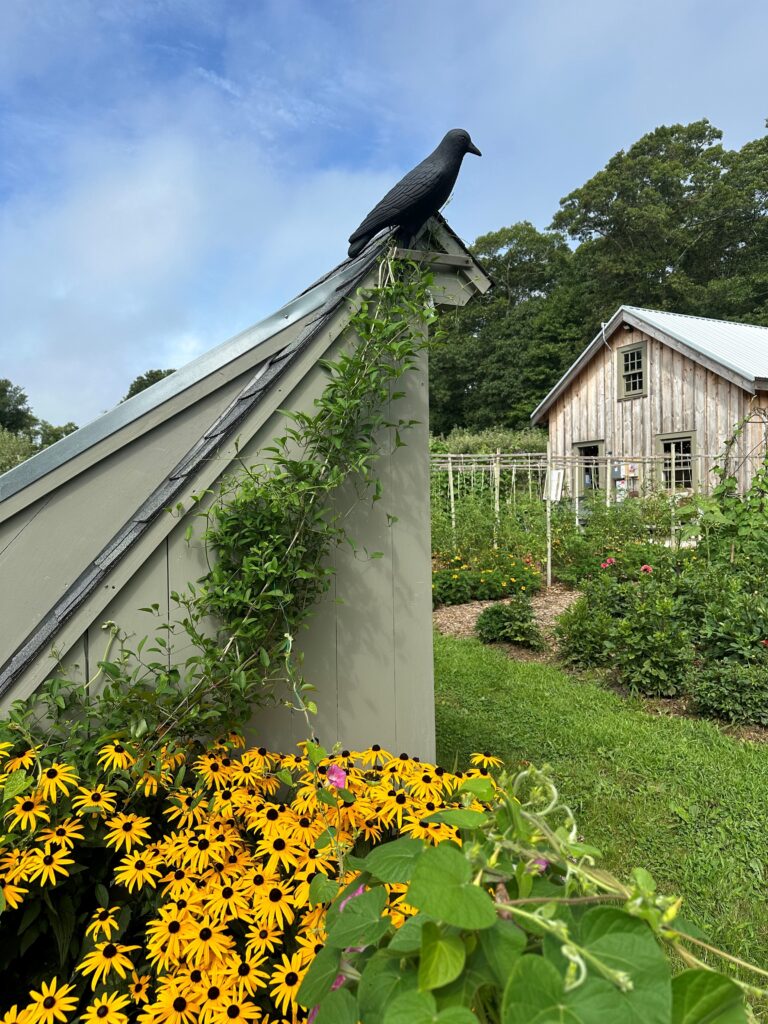
Apples or no, however, Small World Farm has grown into a valuable community resource. Patrick, a carpenter and teacher at Fall River’s Diman Regional Vocational Technical High School, built the barn-like farm stand, aided by a grant from the Rhode Island Department of Environmental Management. The pick-your-own bushel baskets may remain in storage this season, but visitors still travel to the farm to stroll through the orchards and gardens, visit the flock of Rhode Island Red chickens, and browse the farm store.
It is stocked with a variety of produce: vegetables, herbs, and flowers grown in the Small World Farm gardens; eggs from the henhouse; pies and bread made by local bakers; organic goods from Skinny Dip Farm; Fieldstone Kombucha from Bristol; Rhode Island maple syrup; and aromatic bulbs from Little Compton Garlic Farm.
The lack of chemical pesticides makes the farm particularly kid friendly. Fruit and vegetables may be eaten fresh off the vines and branches (though of course they should be weighed and paid for first).
The Bowens are hardly green when it comes to farming and running a small business. In addition to her career as an artist, Claire has managed an ice cream parlor, designed floral arrangements, and even worked at the Old Stone Orchard for a while.
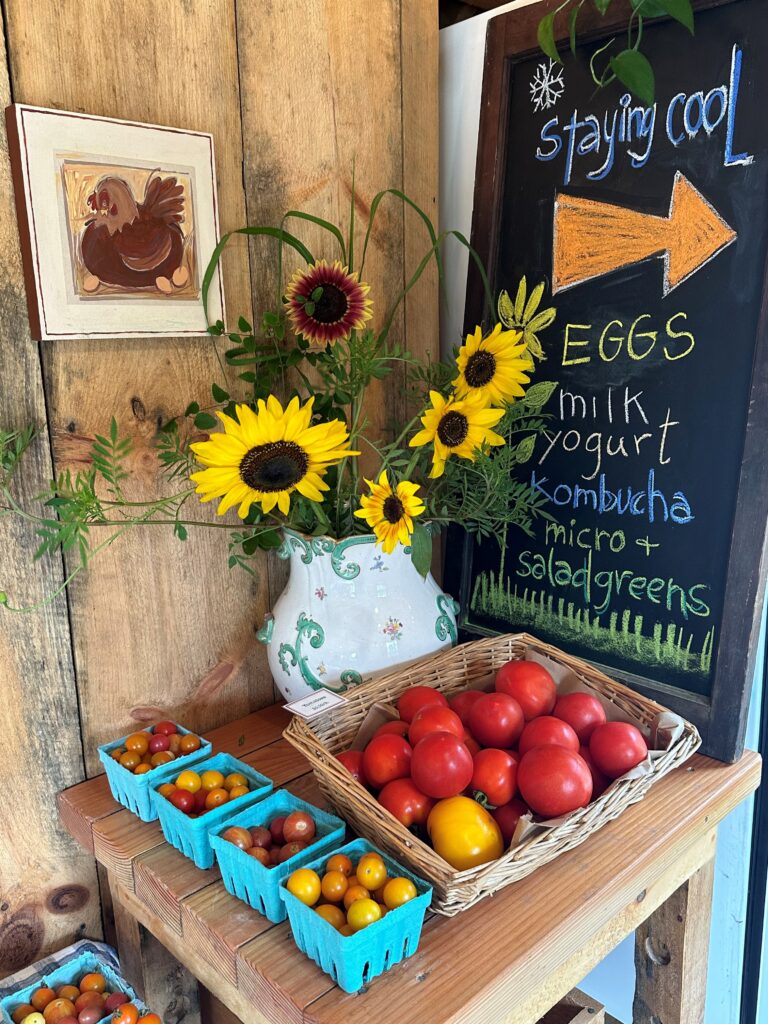
“We’ve always had a bunch of gardens and chickens,” she says. “It seemed like a very large farm, but I kind of knew how to run it.”
Community-building also came naturally, with Claire already part of the South Coast Artists network, which has a particularly strong presence in Little Compton. The work of local artists is displayed at the farm; locally grown succulents, for example, sprout from pots made by Little Compton’s Mika Seeger. But Claire’s vision focuses more on the spacious farm stand’s potential as an event venue rather than a gallery or coffee shop.
“There’s really a sense that there is a lack of places in this town for people to gather,” she says. A large chunk of Little Compton’s population is seasonal, she notes, but while the tourists tend to stick more to the coast-hugging West Main Road and sights like Four Corners and Sakonnet Vineyards, Little Compton locals drive by the farm on their way to shopping in Westport, Mass., or making their weekly trip to the town transfer station.
Elizabeth Bowen, 21, initially helped her parents out with the farm’s social media presence but has become increasingly involved in day-to-day operations.
“It’s been amazing to see it grow,” she says, pointing to events like a holiday market at the farm that drew big crowds and near-sellout sales. “We’re building a community of people who are interested in organic food and supporting local makers.”
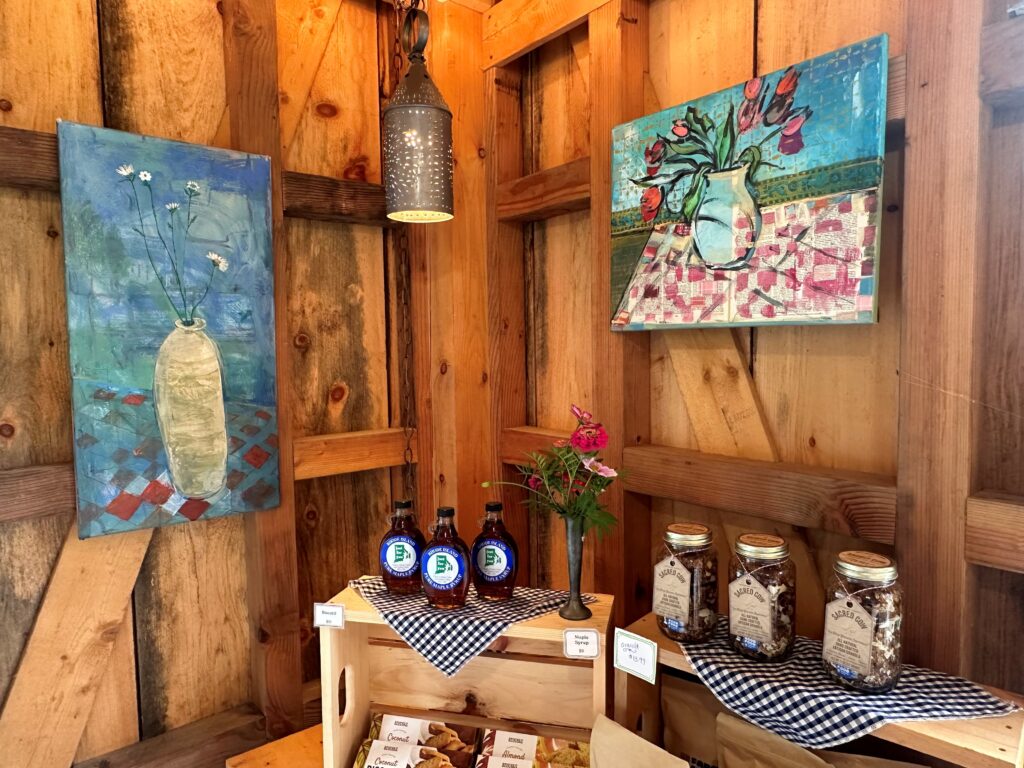
Connections between the farm and the local arts community are cultivated by Claire, who fusses over farm aesthetics when she’s not pruning apple trees. The orchard hasn’t been fenced in against the deer because, apart from the expense, Claire’s on a quest for fencing material that is both an effective barrier and pleasing to the eye. How the farm stand looks from the road is an ongoing concern, and she frequently pauses to rearrange flowers, pull weeds, or reposition signs when she and Patrick aren’t busy hauling around boxes of vegetables or mulching the orchard.
“Artists are among our customer base, so visuals are really important to them,” she says. “It’s hard not to be able to do my own artwork, but this is an outlet for me.”
